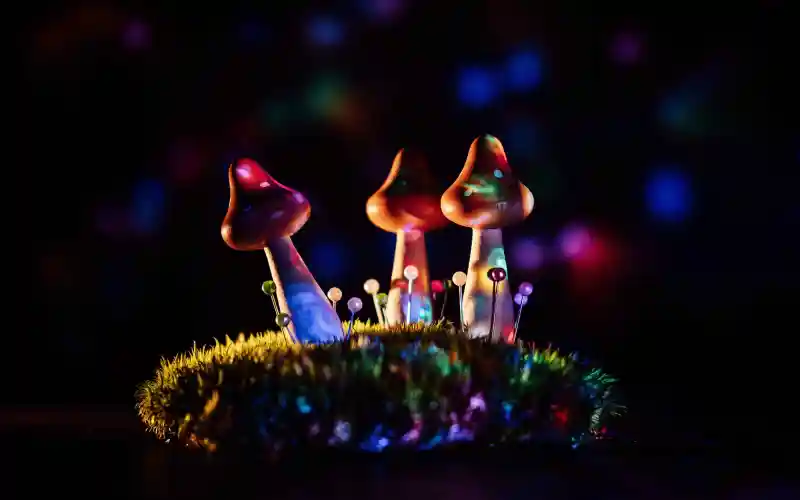Connect with us
Published
6 months agoon

A new study has found that using psilocybin outside of a clinical setting was associated with mental health benefits including decreases in anxiety and depression. The research, which was published last month in the journal Frontiers in Psychiatry, studied nearly 3,000 people who reported on their experience taking psilocybin mushrooms.
To conduct the study, which is reportedly the largest study of psilocybin in a naturalistic (non-clinical) setting, researchers spent two years collecting data from 2,833 participants who planned to take psilocybin for purposes of “self-exploration.” Most participants were college-educated white men in the United States who had previous experience taking psychedelic drugs.
The study participants were asked to fill out five surveys as part of the research. The first survey was completed two weeks prior to the psilocybin experience, which usually consisted of ingesting dried mushrooms, and again the day before the planned psychedelic trip. The remaining surveys were taken one to three days after the experience, two to four weeks after and two to four months after taking the drug.
Not all of the participants who took the initial survey completed all five surveys, however. Of the nearly 2,833 participants who completed the initial survey two to four weeks before taking psilocybin, 1,182 completed the survey two to four weeks later, and 657 completed the final follow-up survey two to three?months after their psilocybin experience.
Upon analyzing the data from the surveys, the researchers determined that participants reported long-lasting reductions in anxiety, depression, alcohol misuse, neuroticism and burnout. Additionally, the participants reported improvements in cognitive flexibility, emotion regulation, spiritual well-being and extraversion.
Not all of the study participants reported positive experiences, however. The researchers noted that a minority of subjects reported “persisting negative effects” following the psilocybin experience. Two to four weeks after taking psilocybin, 11% of survey respondents reported experiencing mood fluctuations and depression, while 7% reported such symptoms two to four months after the experience.
Overall, the authors of the study reported generally positive experiences among the participants, leading them to call for further research into the potential mental health benefits of psilocybin therapy.
“Though the findings reported here are generally positive in nature, questions remain about for whom such use may pose unnecessary risks, mechanisms underlying the persisting changes observed, and in what ways psilocybin’s unique profile of pharmacological effects may be optimally harnessed in clinical or other settings, presenting critical directions for future investigation,” the authors of the study wrote.
Studies conducted by Johns Hopkins and other researchers have shown that psilocybin has the potential to be an effective treatment for several serious mental health conditions, including PTSD, major depressive disorder, anxiety and substance misuse disorders. A study published in 2020 in the peer-reviewed journal JAMA Psychiatry found that psilocybin-assisted psychotherapy was a quick-acting and effective treatment for a group of 24 participants with major depressive disorder. Separate research published in 2016 determined that psilocybin treatment produced substantial and sustained decreases in depression and anxiety in patients with life-threatening cancer.
Federal agencies including the Food and Drug Administration are currently reviewing the potential for psychedelics to treat serious mental health conditions. In May 2022, the head of the Substance Abuse and Mental Health Services Administration wrote to U.S. Representative Madeleine Dean, a Pennsylvania Democrat, that FDA approval of psilocybin to treat depression was likely within the next two years.
As the nation faces rising rates of substance use and mental health issues “we must explore the potential of psychedelic-assisted therapies to address this crisis,” Miriam E. Delphin-Rittmon, assistant secretary for mental health and substance use, wrote to Dean.
The ongoing research has prompted several states to consider legislation to ease the prohibition on psilocybin and other psychedelic drugs, particularly for therapeutic purposes. Last month, Oregon officials issued the state’s first license for a psychedelic therapy treatment center following the legalization of magic mushrooms for therapeutic use with the passage of a 2020 ballot measure. A similar initiative was approved by Colorado voters in 2022.
California could be the next state to decriminalize psychedelics. Earlier this month, Governor Gavin Newsome vetoed a bill that would have decriminalized the possession and use of natural psychedelics including dimethyltryptamine (DMT), mescaline (except for peyote), and psilocybin and psilocin, the primary psychoactive ingredients in magic mushrooms, by adults aged 21 and older. Although he vetoed the measure, at the same time he called on state lawmakers “to send me legislation next year that includes therapeutic guidelines” for psychedelics.
The new study, “Naturalistic psilocybin use is associated with persisting improvements in mental health and wellbeing: results from a prospective, longitudinal survey,” was published in September by the peer-reviewed journal Frontiers in Psychiatry.


Study Reveals State Cannabis Legalization Lowers Immigrant Deportation


DEA Challenges Bid To Use Psilocybin Under ‘Right To Try’ Legislation


Vegans Rejoice as Farmers Switch from Chickens to Hemp


Louisiana Legislative Committee Unanimously Passes Adult-Use Cannabis Framework Bill


Louisiana House Bill to Regulate Hemp Products Advances Along With Senate Bill to Ban


Cresco Labs Workers Reportedly De-Unionize
